Unilever's Organisational Behaviour: Culture, Power, Politics
VerifiedAdded on 2021/02/21
|17
|4891
|501
Report
AI Summary
This report offers a comprehensive analysis of organizational behavior within Unilever, a multinational consumer goods company. It delves into the influence of organizational culture, power structures, and political dynamics on individual and team performance. The report examines Handy's model of organizational culture, exploring power, role, task, and person cultures and their impact on employees. It also assesses the impact of various power sources (positional and personal) on employee behavior. Furthermore, the report evaluates content and process theories of motivation, including Maslow's hierarchy of needs and intrinsic/extrinsic motivation, and how Unilever employs motivational techniques to achieve its goals. It differentiates between effective and ineffective teams, applying group development theories. Finally, the report applies organizational behavior concepts within the context of Unilever's business operations, providing insights into its overall performance and management strategies.
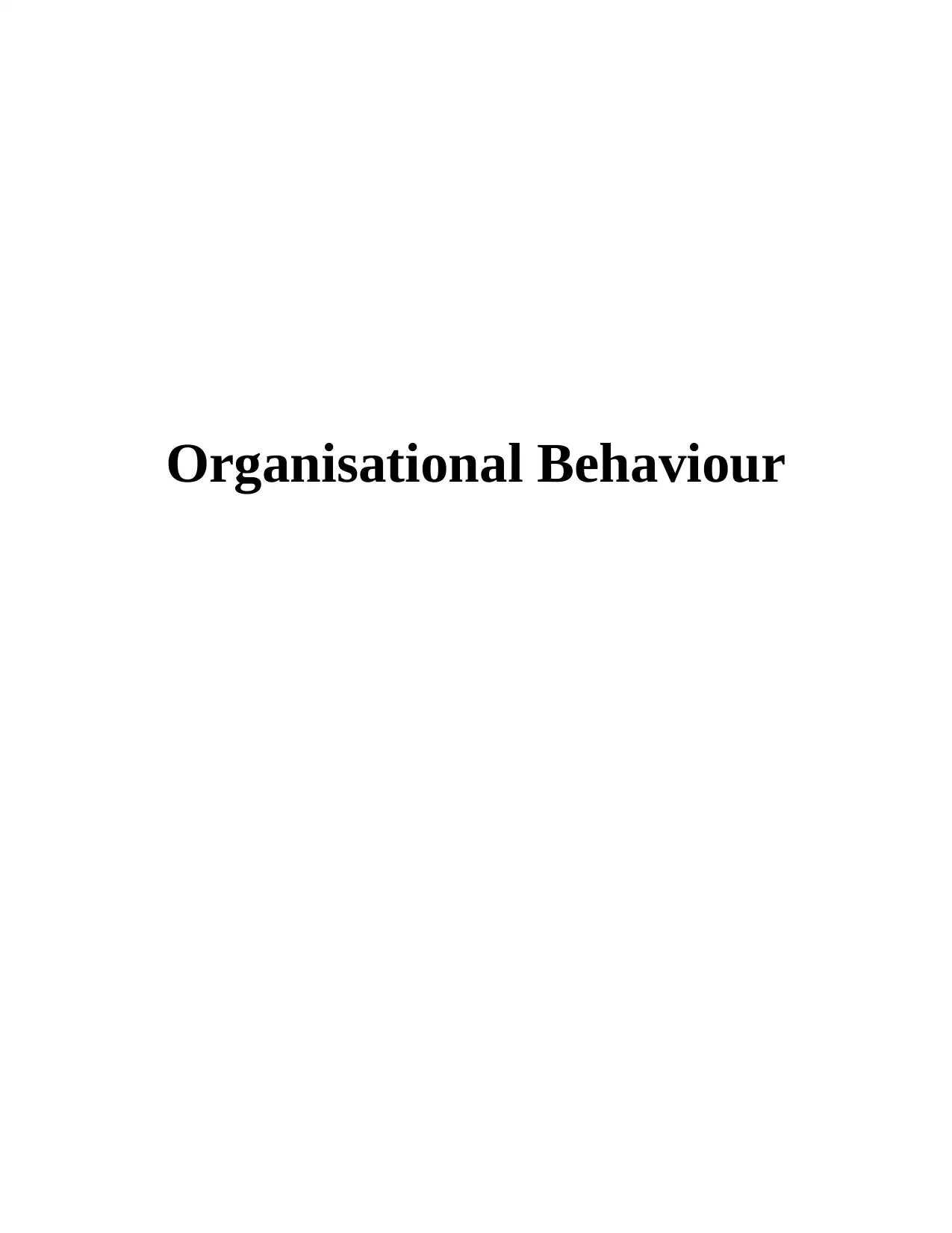
Organisational Behaviour
Paraphrase This Document
Need a fresh take? Get an instant paraphrase of this document with our AI Paraphraser
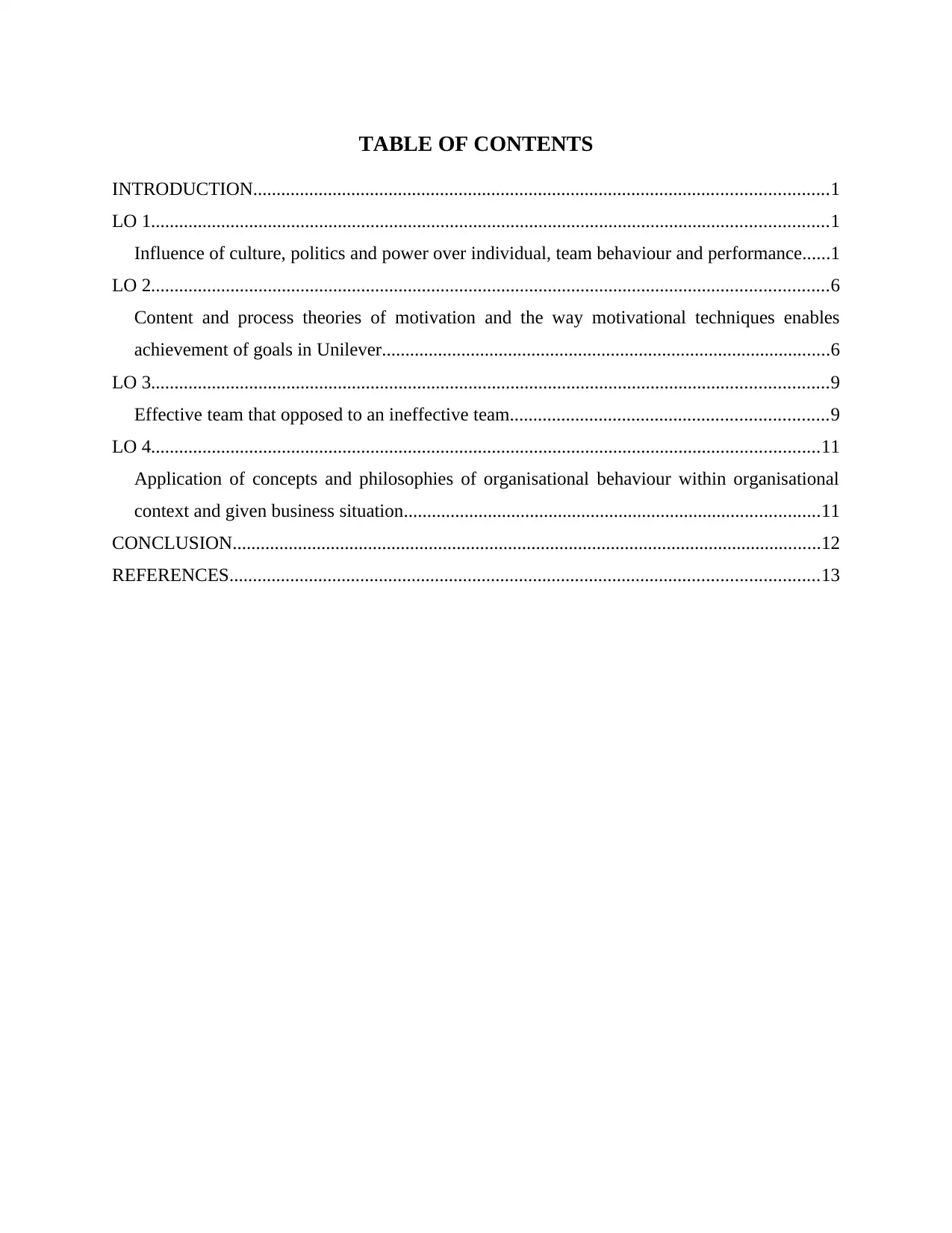
TABLE OF CONTENTS
INTRODUCTION...........................................................................................................................1
LO 1.................................................................................................................................................1
Influence of culture, politics and power over individual, team behaviour and performance......1
LO 2.................................................................................................................................................6
Content and process theories of motivation and the way motivational techniques enables
achievement of goals in Unilever................................................................................................6
LO 3.................................................................................................................................................9
Effective team that opposed to an ineffective team....................................................................9
LO 4...............................................................................................................................................11
Application of concepts and philosophies of organisational behaviour within organisational
context and given business situation.........................................................................................11
CONCLUSION..............................................................................................................................12
REFERENCES..............................................................................................................................13
INTRODUCTION...........................................................................................................................1
LO 1.................................................................................................................................................1
Influence of culture, politics and power over individual, team behaviour and performance......1
LO 2.................................................................................................................................................6
Content and process theories of motivation and the way motivational techniques enables
achievement of goals in Unilever................................................................................................6
LO 3.................................................................................................................................................9
Effective team that opposed to an ineffective team....................................................................9
LO 4...............................................................................................................................................11
Application of concepts and philosophies of organisational behaviour within organisational
context and given business situation.........................................................................................11
CONCLUSION..............................................................................................................................12
REFERENCES..............................................................................................................................13
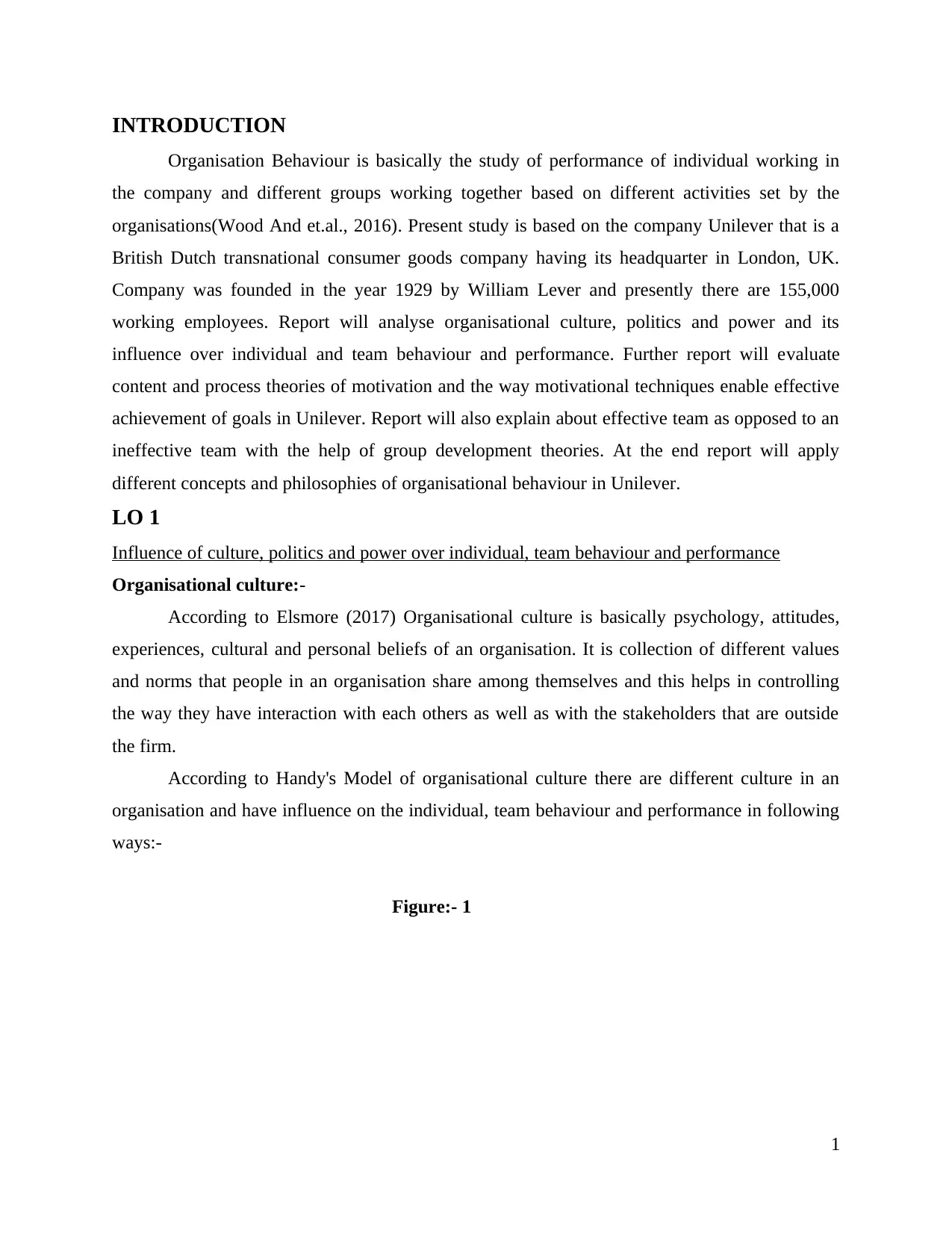
INTRODUCTION
Organisation Behaviour is basically the study of performance of individual working in
the company and different groups working together based on different activities set by the
organisations(Wood And et.al., 2016). Present study is based on the company Unilever that is a
British Dutch transnational consumer goods company having its headquarter in London, UK.
Company was founded in the year 1929 by William Lever and presently there are 155,000
working employees. Report will analyse organisational culture, politics and power and its
influence over individual and team behaviour and performance. Further report will evaluate
content and process theories of motivation and the way motivational techniques enable effective
achievement of goals in Unilever. Report will also explain about effective team as opposed to an
ineffective team with the help of group development theories. At the end report will apply
different concepts and philosophies of organisational behaviour in Unilever.
LO 1
Influence of culture, politics and power over individual, team behaviour and performance
Organisational culture:-
According to Elsmore (2017) Organisational culture is basically psychology, attitudes,
experiences, cultural and personal beliefs of an organisation. It is collection of different values
and norms that people in an organisation share among themselves and this helps in controlling
the way they have interaction with each others as well as with the stakeholders that are outside
the firm.
According to Handy's Model of organisational culture there are different culture in an
organisation and have influence on the individual, team behaviour and performance in following
ways:-
Figure:- 1
1
Organisation Behaviour is basically the study of performance of individual working in
the company and different groups working together based on different activities set by the
organisations(Wood And et.al., 2016). Present study is based on the company Unilever that is a
British Dutch transnational consumer goods company having its headquarter in London, UK.
Company was founded in the year 1929 by William Lever and presently there are 155,000
working employees. Report will analyse organisational culture, politics and power and its
influence over individual and team behaviour and performance. Further report will evaluate
content and process theories of motivation and the way motivational techniques enable effective
achievement of goals in Unilever. Report will also explain about effective team as opposed to an
ineffective team with the help of group development theories. At the end report will apply
different concepts and philosophies of organisational behaviour in Unilever.
LO 1
Influence of culture, politics and power over individual, team behaviour and performance
Organisational culture:-
According to Elsmore (2017) Organisational culture is basically psychology, attitudes,
experiences, cultural and personal beliefs of an organisation. It is collection of different values
and norms that people in an organisation share among themselves and this helps in controlling
the way they have interaction with each others as well as with the stakeholders that are outside
the firm.
According to Handy's Model of organisational culture there are different culture in an
organisation and have influence on the individual, team behaviour and performance in following
ways:-
Figure:- 1
1
⊘ This is a preview!⊘
Do you want full access?
Subscribe today to unlock all pages.

Trusted by 1+ million students worldwide
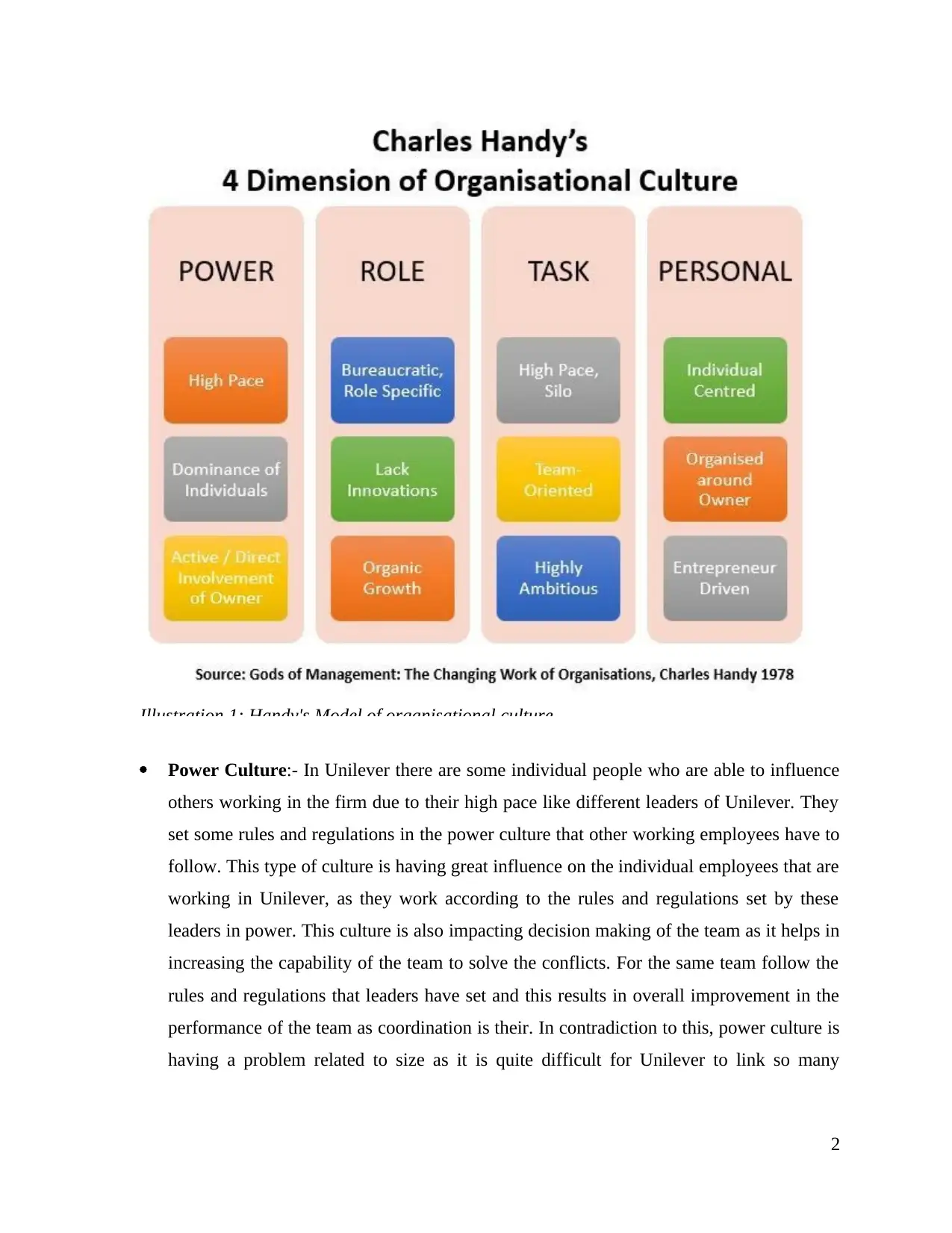
Power Culture:- In Unilever there are some individual people who are able to influence
others working in the firm due to their high pace like different leaders of Unilever. They
set some rules and regulations in the power culture that other working employees have to
follow. This type of culture is having great influence on the individual employees that are
working in Unilever, as they work according to the rules and regulations set by these
leaders in power. This culture is also impacting decision making of the team as it helps in
increasing the capability of the team to solve the conflicts. For the same team follow the
rules and regulations that leaders have set and this results in overall improvement in the
performance of the team as coordination is their. In contradiction to this, power culture is
having a problem related to size as it is quite difficult for Unilever to link so many
2
Illustration 1: Handy's Model of organisational culture
others working in the firm due to their high pace like different leaders of Unilever. They
set some rules and regulations in the power culture that other working employees have to
follow. This type of culture is having great influence on the individual employees that are
working in Unilever, as they work according to the rules and regulations set by these
leaders in power. This culture is also impacting decision making of the team as it helps in
increasing the capability of the team to solve the conflicts. For the same team follow the
rules and regulations that leaders have set and this results in overall improvement in the
performance of the team as coordination is their. In contradiction to this, power culture is
having a problem related to size as it is quite difficult for Unilever to link so many
2
Illustration 1: Handy's Model of organisational culture
Paraphrase This Document
Need a fresh take? Get an instant paraphrase of this document with our AI Paraphraser
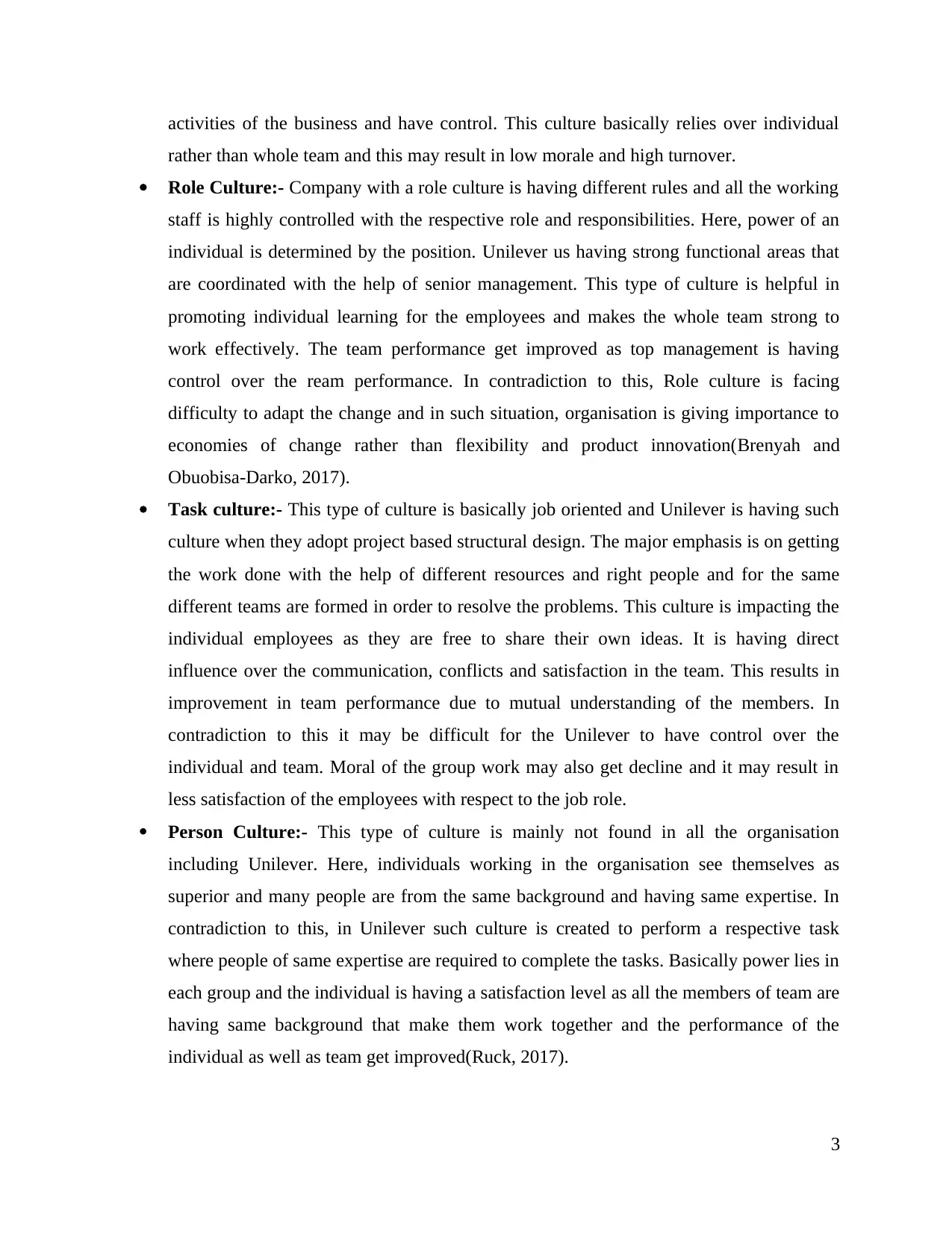
activities of the business and have control. This culture basically relies over individual
rather than whole team and this may result in low morale and high turnover.
Role Culture:- Company with a role culture is having different rules and all the working
staff is highly controlled with the respective role and responsibilities. Here, power of an
individual is determined by the position. Unilever us having strong functional areas that
are coordinated with the help of senior management. This type of culture is helpful in
promoting individual learning for the employees and makes the whole team strong to
work effectively. The team performance get improved as top management is having
control over the ream performance. In contradiction to this, Role culture is facing
difficulty to adapt the change and in such situation, organisation is giving importance to
economies of change rather than flexibility and product innovation(Brenyah and
Obuobisa-Darko, 2017).
Task culture:- This type of culture is basically job oriented and Unilever is having such
culture when they adopt project based structural design. The major emphasis is on getting
the work done with the help of different resources and right people and for the same
different teams are formed in order to resolve the problems. This culture is impacting the
individual employees as they are free to share their own ideas. It is having direct
influence over the communication, conflicts and satisfaction in the team. This results in
improvement in team performance due to mutual understanding of the members. In
contradiction to this it may be difficult for the Unilever to have control over the
individual and team. Moral of the group work may also get decline and it may result in
less satisfaction of the employees with respect to the job role.
Person Culture:- This type of culture is mainly not found in all the organisation
including Unilever. Here, individuals working in the organisation see themselves as
superior and many people are from the same background and having same expertise. In
contradiction to this, in Unilever such culture is created to perform a respective task
where people of same expertise are required to complete the tasks. Basically power lies in
each group and the individual is having a satisfaction level as all the members of team are
having same background that make them work together and the performance of the
individual as well as team get improved(Ruck, 2017).
3
rather than whole team and this may result in low morale and high turnover.
Role Culture:- Company with a role culture is having different rules and all the working
staff is highly controlled with the respective role and responsibilities. Here, power of an
individual is determined by the position. Unilever us having strong functional areas that
are coordinated with the help of senior management. This type of culture is helpful in
promoting individual learning for the employees and makes the whole team strong to
work effectively. The team performance get improved as top management is having
control over the ream performance. In contradiction to this, Role culture is facing
difficulty to adapt the change and in such situation, organisation is giving importance to
economies of change rather than flexibility and product innovation(Brenyah and
Obuobisa-Darko, 2017).
Task culture:- This type of culture is basically job oriented and Unilever is having such
culture when they adopt project based structural design. The major emphasis is on getting
the work done with the help of different resources and right people and for the same
different teams are formed in order to resolve the problems. This culture is impacting the
individual employees as they are free to share their own ideas. It is having direct
influence over the communication, conflicts and satisfaction in the team. This results in
improvement in team performance due to mutual understanding of the members. In
contradiction to this it may be difficult for the Unilever to have control over the
individual and team. Moral of the group work may also get decline and it may result in
less satisfaction of the employees with respect to the job role.
Person Culture:- This type of culture is mainly not found in all the organisation
including Unilever. Here, individuals working in the organisation see themselves as
superior and many people are from the same background and having same expertise. In
contradiction to this, in Unilever such culture is created to perform a respective task
where people of same expertise are required to complete the tasks. Basically power lies in
each group and the individual is having a satisfaction level as all the members of team are
having same background that make them work together and the performance of the
individual as well as team get improved(Ruck, 2017).
3
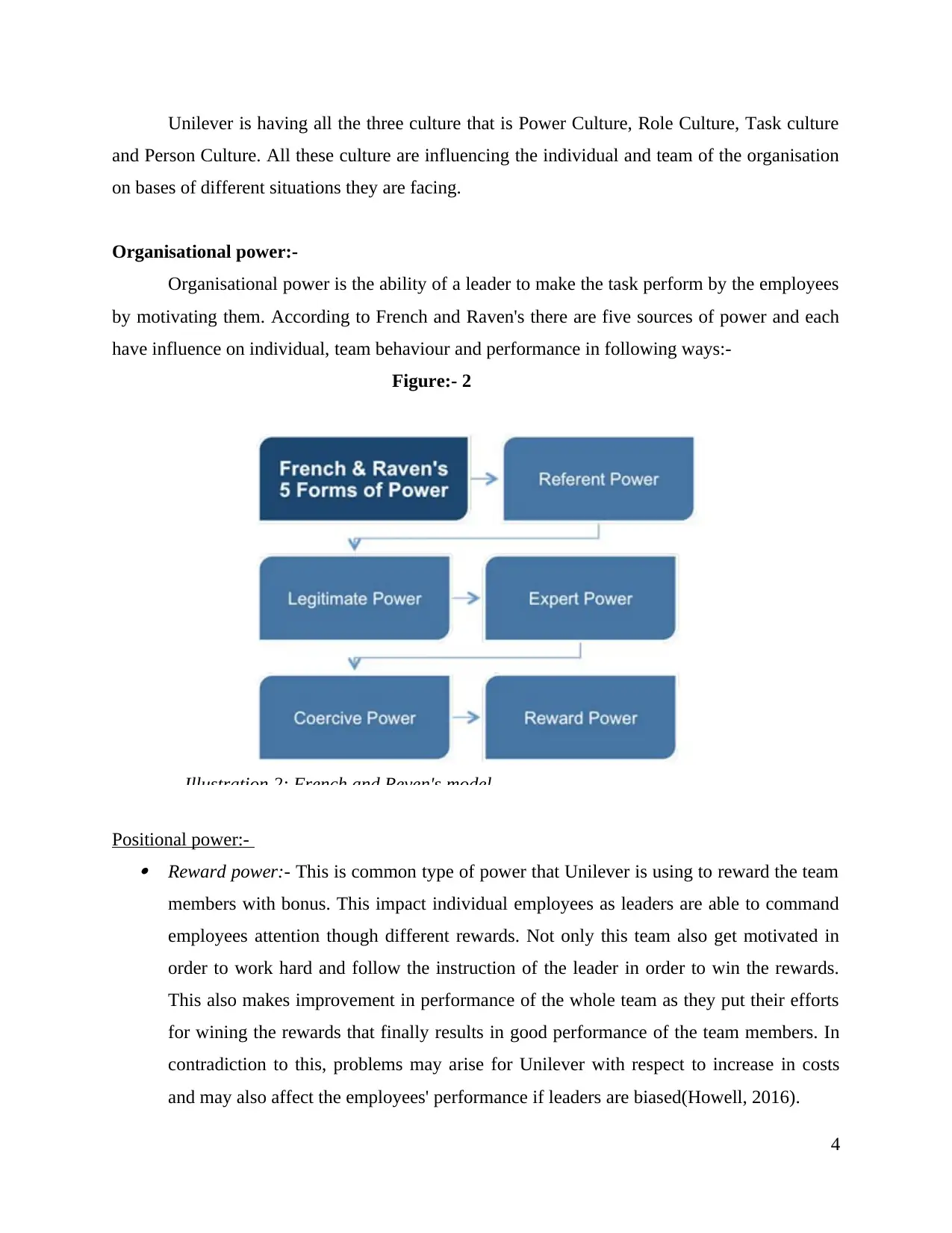
Unilever is having all the three culture that is Power Culture, Role Culture, Task culture
and Person Culture. All these culture are influencing the individual and team of the organisation
on bases of different situations they are facing.
Organisational power:-
Organisational power is the ability of a leader to make the task perform by the employees
by motivating them. According to French and Raven's there are five sources of power and each
have influence on individual, team behaviour and performance in following ways:-
Figure:- 2
Positional power:- Reward power:- This is common type of power that Unilever is using to reward the team
members with bonus. This impact individual employees as leaders are able to command
employees attention though different rewards. Not only this team also get motivated in
order to work hard and follow the instruction of the leader in order to win the rewards.
This also makes improvement in performance of the whole team as they put their efforts
for wining the rewards that finally results in good performance of the team members. In
contradiction to this, problems may arise for Unilever with respect to increase in costs
and may also affect the employees' performance if leaders are biased(Howell, 2016).
4
Illustration 2: French and Reven's model
and Person Culture. All these culture are influencing the individual and team of the organisation
on bases of different situations they are facing.
Organisational power:-
Organisational power is the ability of a leader to make the task perform by the employees
by motivating them. According to French and Raven's there are five sources of power and each
have influence on individual, team behaviour and performance in following ways:-
Figure:- 2
Positional power:- Reward power:- This is common type of power that Unilever is using to reward the team
members with bonus. This impact individual employees as leaders are able to command
employees attention though different rewards. Not only this team also get motivated in
order to work hard and follow the instruction of the leader in order to win the rewards.
This also makes improvement in performance of the whole team as they put their efforts
for wining the rewards that finally results in good performance of the team members. In
contradiction to this, problems may arise for Unilever with respect to increase in costs
and may also affect the employees' performance if leaders are biased(Howell, 2016).
4
Illustration 2: French and Reven's model
⊘ This is a preview!⊘
Do you want full access?
Subscribe today to unlock all pages.

Trusted by 1+ million students worldwide
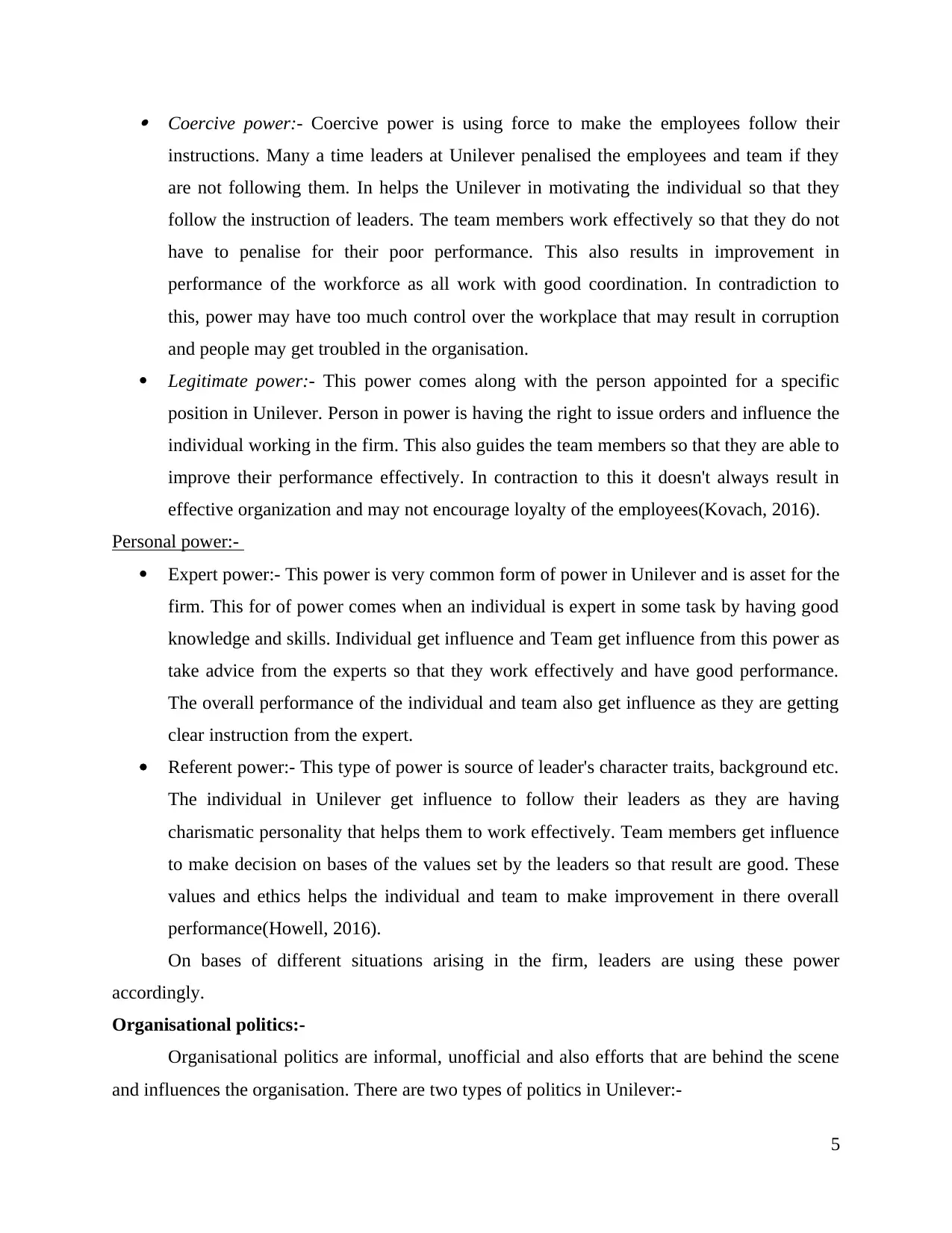
Coercive power:- Coercive power is using force to make the employees follow their
instructions. Many a time leaders at Unilever penalised the employees and team if they
are not following them. In helps the Unilever in motivating the individual so that they
follow the instruction of leaders. The team members work effectively so that they do not
have to penalise for their poor performance. This also results in improvement in
performance of the workforce as all work with good coordination. In contradiction to
this, power may have too much control over the workplace that may result in corruption
and people may get troubled in the organisation.
Legitimate power:- This power comes along with the person appointed for a specific
position in Unilever. Person in power is having the right to issue orders and influence the
individual working in the firm. This also guides the team members so that they are able to
improve their performance effectively. In contraction to this it doesn't always result in
effective organization and may not encourage loyalty of the employees(Kovach, 2016).
Personal power:-
Expert power:- This power is very common form of power in Unilever and is asset for the
firm. This for of power comes when an individual is expert in some task by having good
knowledge and skills. Individual get influence and Team get influence from this power as
take advice from the experts so that they work effectively and have good performance.
The overall performance of the individual and team also get influence as they are getting
clear instruction from the expert.
Referent power:- This type of power is source of leader's character traits, background etc.
The individual in Unilever get influence to follow their leaders as they are having
charismatic personality that helps them to work effectively. Team members get influence
to make decision on bases of the values set by the leaders so that result are good. These
values and ethics helps the individual and team to make improvement in there overall
performance(Howell, 2016).
On bases of different situations arising in the firm, leaders are using these power
accordingly.
Organisational politics:-
Organisational politics are informal, unofficial and also efforts that are behind the scene
and influences the organisation. There are two types of politics in Unilever:-
5
instructions. Many a time leaders at Unilever penalised the employees and team if they
are not following them. In helps the Unilever in motivating the individual so that they
follow the instruction of leaders. The team members work effectively so that they do not
have to penalise for their poor performance. This also results in improvement in
performance of the workforce as all work with good coordination. In contradiction to
this, power may have too much control over the workplace that may result in corruption
and people may get troubled in the organisation.
Legitimate power:- This power comes along with the person appointed for a specific
position in Unilever. Person in power is having the right to issue orders and influence the
individual working in the firm. This also guides the team members so that they are able to
improve their performance effectively. In contraction to this it doesn't always result in
effective organization and may not encourage loyalty of the employees(Kovach, 2016).
Personal power:-
Expert power:- This power is very common form of power in Unilever and is asset for the
firm. This for of power comes when an individual is expert in some task by having good
knowledge and skills. Individual get influence and Team get influence from this power as
take advice from the experts so that they work effectively and have good performance.
The overall performance of the individual and team also get influence as they are getting
clear instruction from the expert.
Referent power:- This type of power is source of leader's character traits, background etc.
The individual in Unilever get influence to follow their leaders as they are having
charismatic personality that helps them to work effectively. Team members get influence
to make decision on bases of the values set by the leaders so that result are good. These
values and ethics helps the individual and team to make improvement in there overall
performance(Howell, 2016).
On bases of different situations arising in the firm, leaders are using these power
accordingly.
Organisational politics:-
Organisational politics are informal, unofficial and also efforts that are behind the scene
and influences the organisation. There are two types of politics in Unilever:-
5
Paraphrase This Document
Need a fresh take? Get an instant paraphrase of this document with our AI Paraphraser
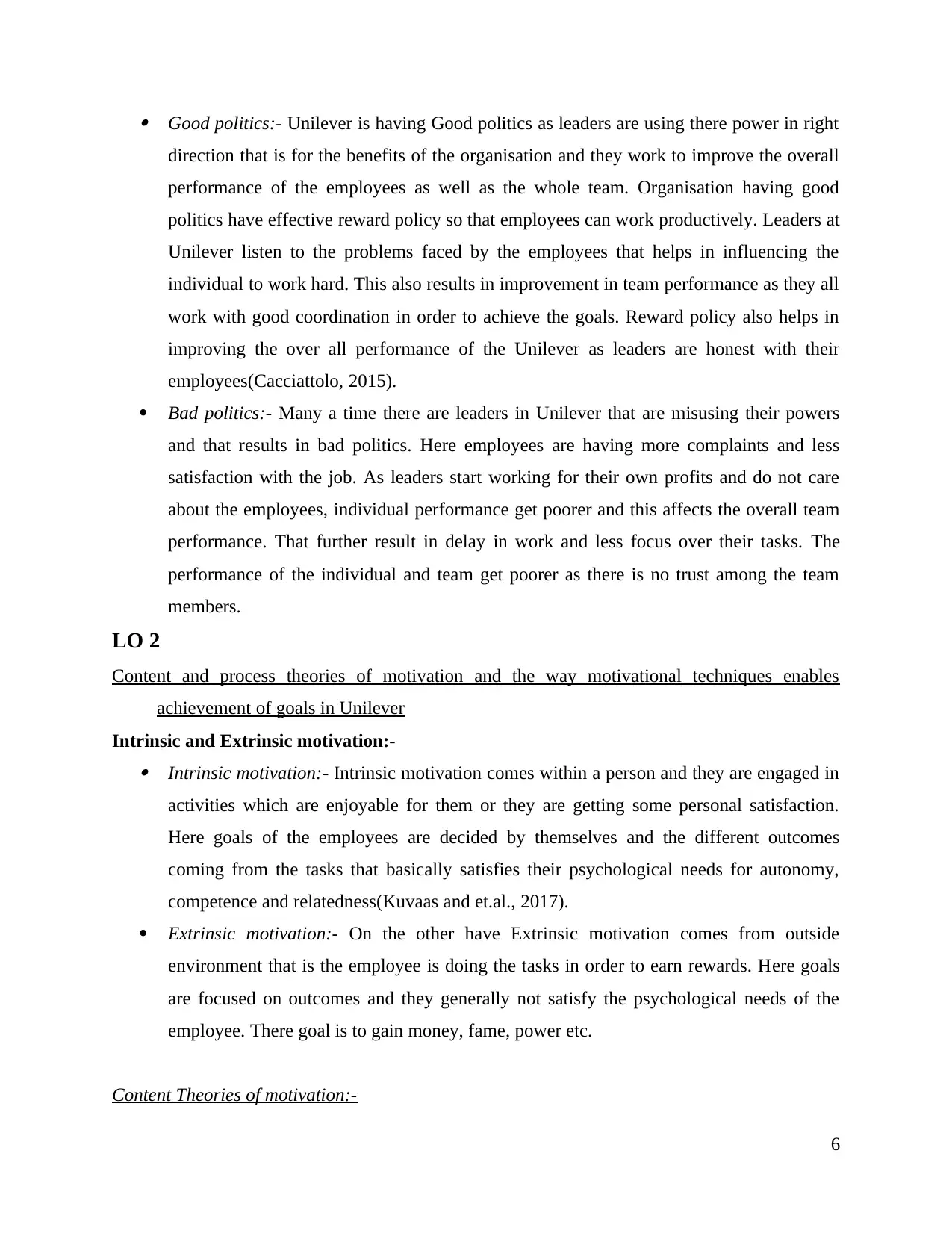
Good politics:- Unilever is having Good politics as leaders are using there power in right
direction that is for the benefits of the organisation and they work to improve the overall
performance of the employees as well as the whole team. Organisation having good
politics have effective reward policy so that employees can work productively. Leaders at
Unilever listen to the problems faced by the employees that helps in influencing the
individual to work hard. This also results in improvement in team performance as they all
work with good coordination in order to achieve the goals. Reward policy also helps in
improving the over all performance of the Unilever as leaders are honest with their
employees(Cacciattolo, 2015).
Bad politics:- Many a time there are leaders in Unilever that are misusing their powers
and that results in bad politics. Here employees are having more complaints and less
satisfaction with the job. As leaders start working for their own profits and do not care
about the employees, individual performance get poorer and this affects the overall team
performance. That further result in delay in work and less focus over their tasks. The
performance of the individual and team get poorer as there is no trust among the team
members.
LO 2
Content and process theories of motivation and the way motivational techniques enables
achievement of goals in Unilever
Intrinsic and Extrinsic motivation:- Intrinsic motivation:- Intrinsic motivation comes within a person and they are engaged in
activities which are enjoyable for them or they are getting some personal satisfaction.
Here goals of the employees are decided by themselves and the different outcomes
coming from the tasks that basically satisfies their psychological needs for autonomy,
competence and relatedness(Kuvaas and et.al., 2017).
Extrinsic motivation:- On the other have Extrinsic motivation comes from outside
environment that is the employee is doing the tasks in order to earn rewards. Here goals
are focused on outcomes and they generally not satisfy the psychological needs of the
employee. There goal is to gain money, fame, power etc.
Content Theories of motivation:-
6
direction that is for the benefits of the organisation and they work to improve the overall
performance of the employees as well as the whole team. Organisation having good
politics have effective reward policy so that employees can work productively. Leaders at
Unilever listen to the problems faced by the employees that helps in influencing the
individual to work hard. This also results in improvement in team performance as they all
work with good coordination in order to achieve the goals. Reward policy also helps in
improving the over all performance of the Unilever as leaders are honest with their
employees(Cacciattolo, 2015).
Bad politics:- Many a time there are leaders in Unilever that are misusing their powers
and that results in bad politics. Here employees are having more complaints and less
satisfaction with the job. As leaders start working for their own profits and do not care
about the employees, individual performance get poorer and this affects the overall team
performance. That further result in delay in work and less focus over their tasks. The
performance of the individual and team get poorer as there is no trust among the team
members.
LO 2
Content and process theories of motivation and the way motivational techniques enables
achievement of goals in Unilever
Intrinsic and Extrinsic motivation:- Intrinsic motivation:- Intrinsic motivation comes within a person and they are engaged in
activities which are enjoyable for them or they are getting some personal satisfaction.
Here goals of the employees are decided by themselves and the different outcomes
coming from the tasks that basically satisfies their psychological needs for autonomy,
competence and relatedness(Kuvaas and et.al., 2017).
Extrinsic motivation:- On the other have Extrinsic motivation comes from outside
environment that is the employee is doing the tasks in order to earn rewards. Here goals
are focused on outcomes and they generally not satisfy the psychological needs of the
employee. There goal is to gain money, fame, power etc.
Content Theories of motivation:-
6
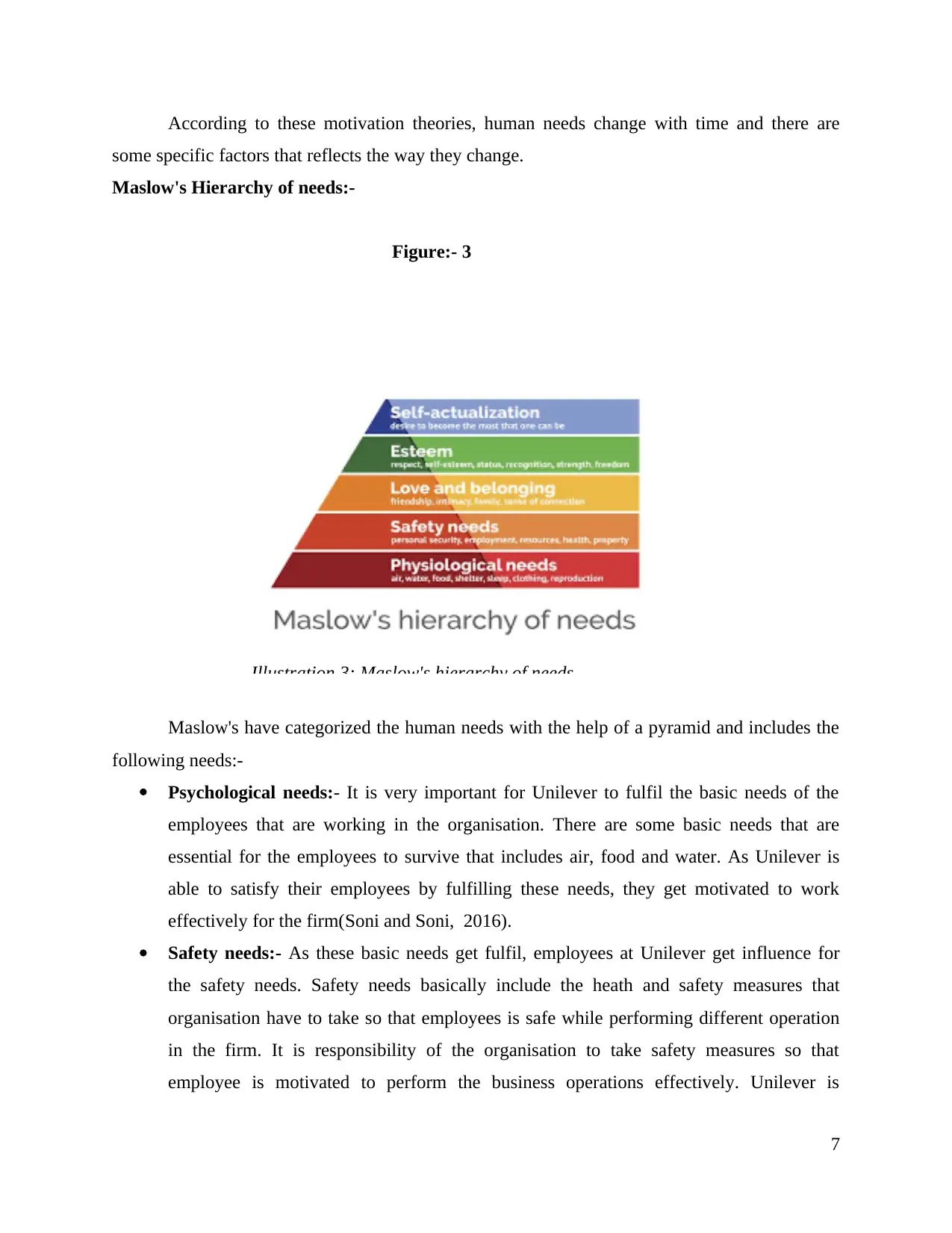
According to these motivation theories, human needs change with time and there are
some specific factors that reflects the way they change.
Maslow's Hierarchy of needs:-
Figure:- 3
Maslow's have categorized the human needs with the help of a pyramid and includes the
following needs:-
Psychological needs:- It is very important for Unilever to fulfil the basic needs of the
employees that are working in the organisation. There are some basic needs that are
essential for the employees to survive that includes air, food and water. As Unilever is
able to satisfy their employees by fulfilling these needs, they get motivated to work
effectively for the firm(Soni and Soni, 2016).
Safety needs:- As these basic needs get fulfil, employees at Unilever get influence for
the safety needs. Safety needs basically include the heath and safety measures that
organisation have to take so that employees is safe while performing different operation
in the firm. It is responsibility of the organisation to take safety measures so that
employee is motivated to perform the business operations effectively. Unilever is
7
Illustration 3: Maslow's hierarchy of needs
some specific factors that reflects the way they change.
Maslow's Hierarchy of needs:-
Figure:- 3
Maslow's have categorized the human needs with the help of a pyramid and includes the
following needs:-
Psychological needs:- It is very important for Unilever to fulfil the basic needs of the
employees that are working in the organisation. There are some basic needs that are
essential for the employees to survive that includes air, food and water. As Unilever is
able to satisfy their employees by fulfilling these needs, they get motivated to work
effectively for the firm(Soni and Soni, 2016).
Safety needs:- As these basic needs get fulfil, employees at Unilever get influence for
the safety needs. Safety needs basically include the heath and safety measures that
organisation have to take so that employees is safe while performing different operation
in the firm. It is responsibility of the organisation to take safety measures so that
employee is motivated to perform the business operations effectively. Unilever is
7
Illustration 3: Maslow's hierarchy of needs
⊘ This is a preview!⊘
Do you want full access?
Subscribe today to unlock all pages.

Trusted by 1+ million students worldwide
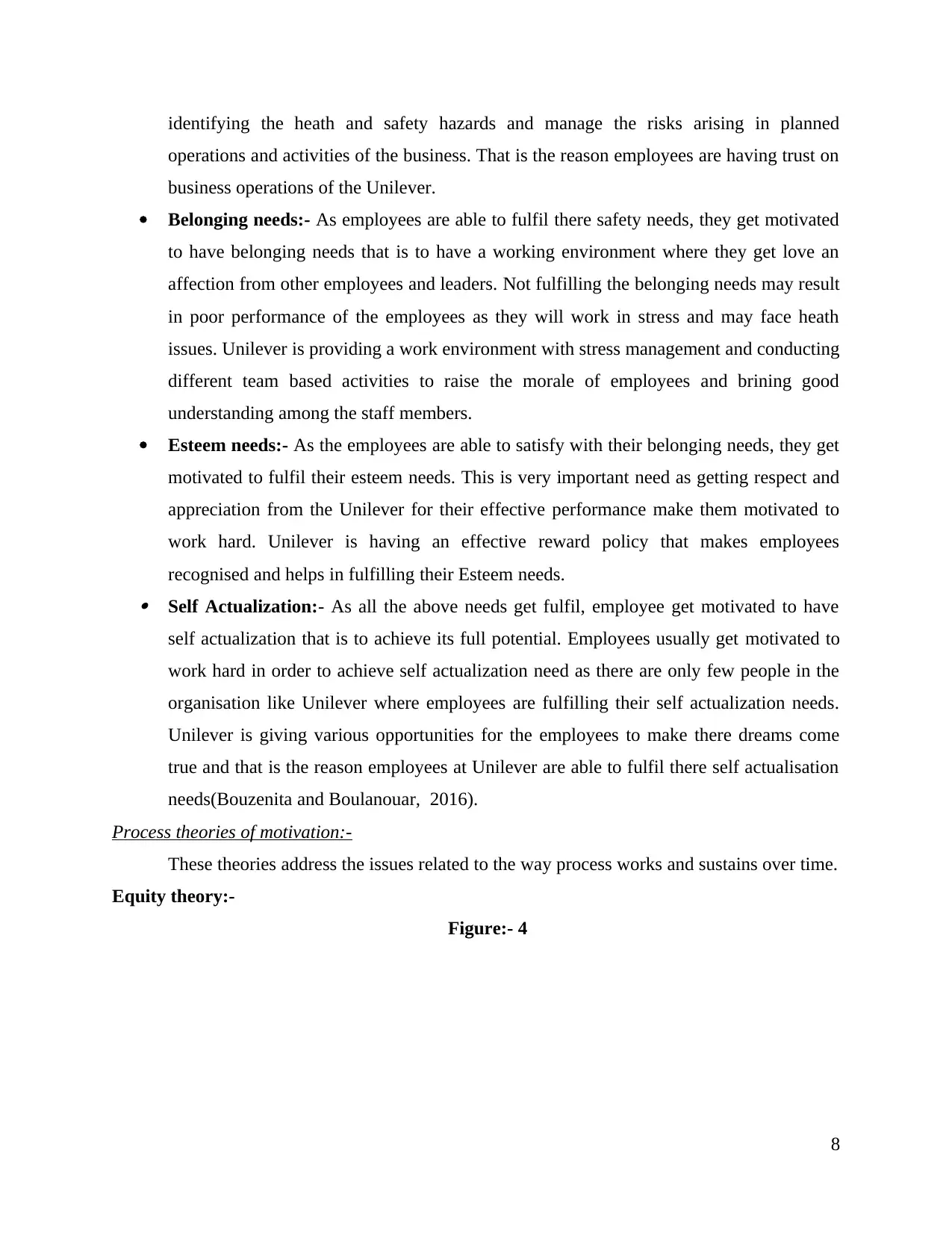
identifying the heath and safety hazards and manage the risks arising in planned
operations and activities of the business. That is the reason employees are having trust on
business operations of the Unilever.
Belonging needs:- As employees are able to fulfil there safety needs, they get motivated
to have belonging needs that is to have a working environment where they get love an
affection from other employees and leaders. Not fulfilling the belonging needs may result
in poor performance of the employees as they will work in stress and may face heath
issues. Unilever is providing a work environment with stress management and conducting
different team based activities to raise the morale of employees and brining good
understanding among the staff members.
Esteem needs:- As the employees are able to satisfy with their belonging needs, they get
motivated to fulfil their esteem needs. This is very important need as getting respect and
appreciation from the Unilever for their effective performance make them motivated to
work hard. Unilever is having an effective reward policy that makes employees
recognised and helps in fulfilling their Esteem needs. Self Actualization:- As all the above needs get fulfil, employee get motivated to have
self actualization that is to achieve its full potential. Employees usually get motivated to
work hard in order to achieve self actualization need as there are only few people in the
organisation like Unilever where employees are fulfilling their self actualization needs.
Unilever is giving various opportunities for the employees to make there dreams come
true and that is the reason employees at Unilever are able to fulfil there self actualisation
needs(Bouzenita and Boulanouar, 2016).
Process theories of motivation:-
These theories address the issues related to the way process works and sustains over time.
Equity theory:-
Figure:- 4
8
operations and activities of the business. That is the reason employees are having trust on
business operations of the Unilever.
Belonging needs:- As employees are able to fulfil there safety needs, they get motivated
to have belonging needs that is to have a working environment where they get love an
affection from other employees and leaders. Not fulfilling the belonging needs may result
in poor performance of the employees as they will work in stress and may face heath
issues. Unilever is providing a work environment with stress management and conducting
different team based activities to raise the morale of employees and brining good
understanding among the staff members.
Esteem needs:- As the employees are able to satisfy with their belonging needs, they get
motivated to fulfil their esteem needs. This is very important need as getting respect and
appreciation from the Unilever for their effective performance make them motivated to
work hard. Unilever is having an effective reward policy that makes employees
recognised and helps in fulfilling their Esteem needs. Self Actualization:- As all the above needs get fulfil, employee get motivated to have
self actualization that is to achieve its full potential. Employees usually get motivated to
work hard in order to achieve self actualization need as there are only few people in the
organisation like Unilever where employees are fulfilling their self actualization needs.
Unilever is giving various opportunities for the employees to make there dreams come
true and that is the reason employees at Unilever are able to fulfil there self actualisation
needs(Bouzenita and Boulanouar, 2016).
Process theories of motivation:-
These theories address the issues related to the way process works and sustains over time.
Equity theory:-
Figure:- 4
8
Paraphrase This Document
Need a fresh take? Get an instant paraphrase of this document with our AI Paraphraser
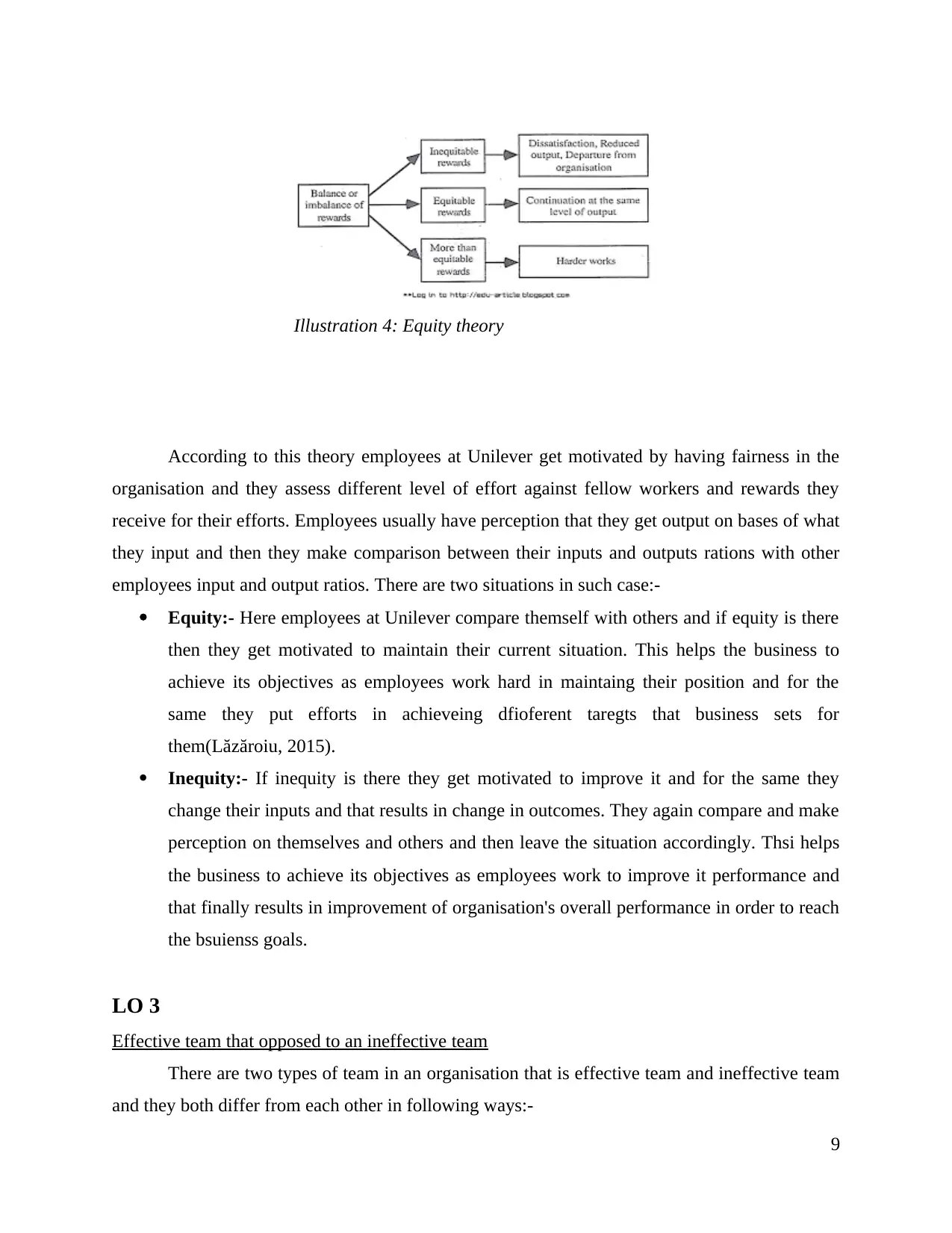
According to this theory employees at Unilever get motivated by having fairness in the
organisation and they assess different level of effort against fellow workers and rewards they
receive for their efforts. Employees usually have perception that they get output on bases of what
they input and then they make comparison between their inputs and outputs rations with other
employees input and output ratios. There are two situations in such case:-
Equity:- Here employees at Unilever compare themself with others and if equity is there
then they get motivated to maintain their current situation. This helps the business to
achieve its objectives as employees work hard in maintaing their position and for the
same they put efforts in achieveing dfioferent taregts that business sets for
them(Lăzăroiu, 2015).
Inequity:- If inequity is there they get motivated to improve it and for the same they
change their inputs and that results in change in outcomes. They again compare and make
perception on themselves and others and then leave the situation accordingly. Thsi helps
the business to achieve its objectives as employees work to improve it performance and
that finally results in improvement of organisation's overall performance in order to reach
the bsuienss goals.
LO 3
Effective team that opposed to an ineffective team
There are two types of team in an organisation that is effective team and ineffective team
and they both differ from each other in following ways:-
9
Illustration 4: Equity theory
organisation and they assess different level of effort against fellow workers and rewards they
receive for their efforts. Employees usually have perception that they get output on bases of what
they input and then they make comparison between their inputs and outputs rations with other
employees input and output ratios. There are two situations in such case:-
Equity:- Here employees at Unilever compare themself with others and if equity is there
then they get motivated to maintain their current situation. This helps the business to
achieve its objectives as employees work hard in maintaing their position and for the
same they put efforts in achieveing dfioferent taregts that business sets for
them(Lăzăroiu, 2015).
Inequity:- If inequity is there they get motivated to improve it and for the same they
change their inputs and that results in change in outcomes. They again compare and make
perception on themselves and others and then leave the situation accordingly. Thsi helps
the business to achieve its objectives as employees work to improve it performance and
that finally results in improvement of organisation's overall performance in order to reach
the bsuienss goals.
LO 3
Effective team that opposed to an ineffective team
There are two types of team in an organisation that is effective team and ineffective team
and they both differ from each other in following ways:-
9
Illustration 4: Equity theory
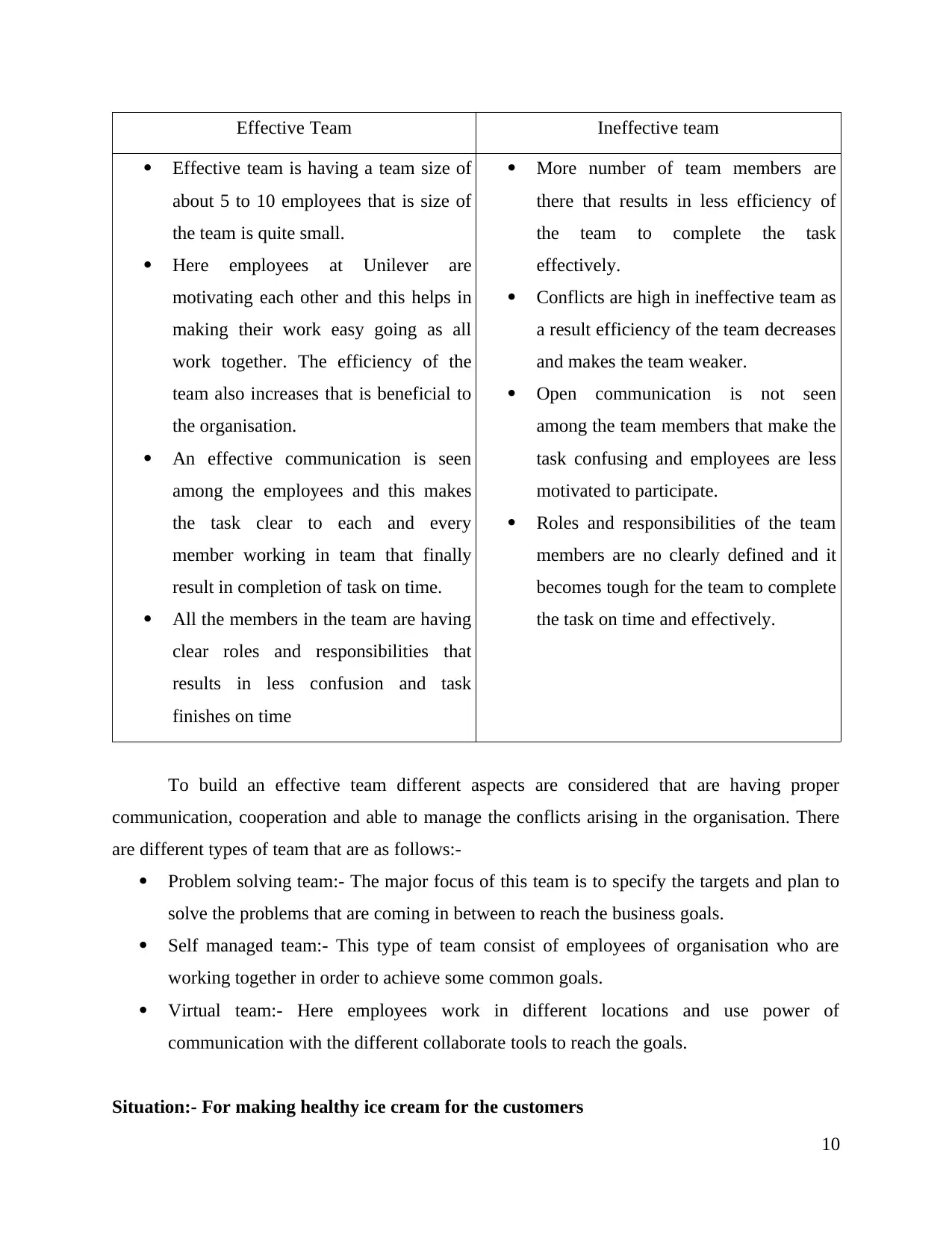
Effective Team Ineffective team
Effective team is having a team size of
about 5 to 10 employees that is size of
the team is quite small.
Here employees at Unilever are
motivating each other and this helps in
making their work easy going as all
work together. The efficiency of the
team also increases that is beneficial to
the organisation.
An effective communication is seen
among the employees and this makes
the task clear to each and every
member working in team that finally
result in completion of task on time.
All the members in the team are having
clear roles and responsibilities that
results in less confusion and task
finishes on time
More number of team members are
there that results in less efficiency of
the team to complete the task
effectively.
Conflicts are high in ineffective team as
a result efficiency of the team decreases
and makes the team weaker.
Open communication is not seen
among the team members that make the
task confusing and employees are less
motivated to participate.
Roles and responsibilities of the team
members are no clearly defined and it
becomes tough for the team to complete
the task on time and effectively.
To build an effective team different aspects are considered that are having proper
communication, cooperation and able to manage the conflicts arising in the organisation. There
are different types of team that are as follows:-
Problem solving team:- The major focus of this team is to specify the targets and plan to
solve the problems that are coming in between to reach the business goals.
Self managed team:- This type of team consist of employees of organisation who are
working together in order to achieve some common goals.
Virtual team:- Here employees work in different locations and use power of
communication with the different collaborate tools to reach the goals.
Situation:- For making healthy ice cream for the customers
10
Effective team is having a team size of
about 5 to 10 employees that is size of
the team is quite small.
Here employees at Unilever are
motivating each other and this helps in
making their work easy going as all
work together. The efficiency of the
team also increases that is beneficial to
the organisation.
An effective communication is seen
among the employees and this makes
the task clear to each and every
member working in team that finally
result in completion of task on time.
All the members in the team are having
clear roles and responsibilities that
results in less confusion and task
finishes on time
More number of team members are
there that results in less efficiency of
the team to complete the task
effectively.
Conflicts are high in ineffective team as
a result efficiency of the team decreases
and makes the team weaker.
Open communication is not seen
among the team members that make the
task confusing and employees are less
motivated to participate.
Roles and responsibilities of the team
members are no clearly defined and it
becomes tough for the team to complete
the task on time and effectively.
To build an effective team different aspects are considered that are having proper
communication, cooperation and able to manage the conflicts arising in the organisation. There
are different types of team that are as follows:-
Problem solving team:- The major focus of this team is to specify the targets and plan to
solve the problems that are coming in between to reach the business goals.
Self managed team:- This type of team consist of employees of organisation who are
working together in order to achieve some common goals.
Virtual team:- Here employees work in different locations and use power of
communication with the different collaborate tools to reach the goals.
Situation:- For making healthy ice cream for the customers
10
⊘ This is a preview!⊘
Do you want full access?
Subscribe today to unlock all pages.

Trusted by 1+ million students worldwide
1 out of 17
Related Documents
Your All-in-One AI-Powered Toolkit for Academic Success.
+13062052269
info@desklib.com
Available 24*7 on WhatsApp / Email
![[object Object]](/_next/static/media/star-bottom.7253800d.svg)
Unlock your academic potential
Copyright © 2020–2025 A2Z Services. All Rights Reserved. Developed and managed by ZUCOL.





